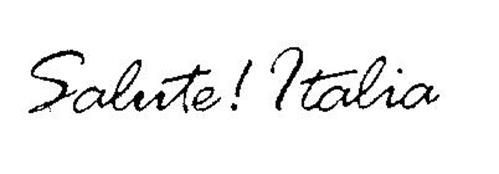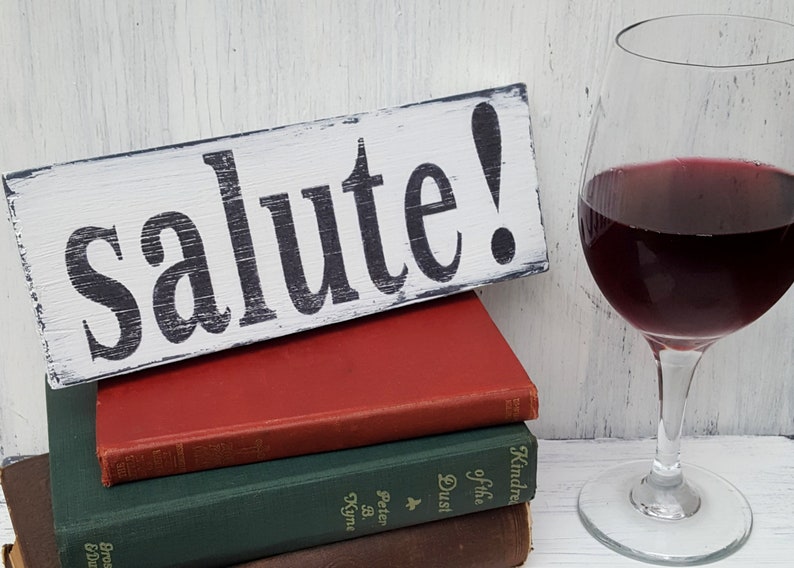


( General American ) IPA ( key): /səˈlut/.( Received Pronunciation ) IPA ( key): /səˈl(j)uːt/ In the first test - from English into Italian - it proved to be very accurate, especially good at grasping the meaning of the sentence, rather than being.
SALUTE MEANING ITALIAN HOW TO
Lynne Rossetto Kasper hosts "The Splendid Table," American Public Media's weekly national show for people who love eat, and is the co-author of "The Splendid Table's How to Eat Supper: Recipes, Stories, and Opinions." Ask questions and find Lynne, recipes and station listings at or 80.English Etymology A girl performing a scout salute (formal gesture)īorrowed from Latin salūtō ( “ to greet to wish health to ” ), from salūs ( “ greeting, good health ” ), related to salvus ( “ safe ” ). Serve them hot with warm corn tortillas on the side. Lower the heat to medium-low and keep folding over the eggs and saute, scraping up any egg sticking to the pan, for 3 minutes, or until large curds form.Įggs can be served one of three ways: almost wet moist yet approaching firm (my preference) or quite firm. Add the eggs, and with a heatproof plastic spatula gently fold them into the saute. Don't beat, just blend them until combined. Stir in the cream cheese, parsley, basil and a little salt and pepper. And yet You really shouldnt be saying it when you go to. In a medium bowl, use a fork to loosely blend the eggs and water. Its crossed borders, becoming a greeting used all over the world. CAN YOU ANSWER THESE COMMON GRAMMAR DEBATES There are grammar. Saute until the peppers soften, then add the oregano, garlic and tomatoes.

Add the onions and peppers with a little salt and pepper. Salt and freshly ground black pepper, as neededģ ounces cream cheese, cut into about 3/4-inch piecesġ/2 tightly packed tablespoon curly parsley leaves, choppedġ/2 tightly packed tablespoon fresh basil or tarragon leaves, choppedįilm the bottom of a 10-inch skillet (nonstick preferred) with olive oil. Here's one take.ġ each medium-sized sweet red and yellow pepper, cut into small dice Take any saute you can think of, from a stir-fry to onions and peppers, and gently cook beaten eggs into it. Of course, now I am hitting the wall with fewer and fewer ideas.ĭear Workin' the Toaster: You've only begun to fight. The meaning is much like other countries with to your health. That is, except in Japan (which I think you already know), where you do not want to use it, since it refers to a personal part of the male anatomy.ĭear Lynne: My teen-age kids love breakfast for supper, which makes me eternally grateful, since last year they'd only eat steak or pork chops. Salute The more formal cheers and toasting of one another is by saying Salute. "Chin-chin" is surely one of those expressions evolved from a bastardization of a foreign language, and the sound was so appealing it caught on around the globe. Reliable information? Probably not, but dependable in the sense that we humans enjoy playing with the truth and new words. The stiff-kneed creatures would come out, taste the beer and call out, "Chin Chin." Hunters would make holes in the rocks of the cliff, fill them with strong beer and hide. saluté ( Piedmontese) Pronunciation IPA: /salyte/ Verb saluté Quote, Rate & Share Cite this page: 'saluté' WordSense Online Dictionary (7th May, 2023) URL: User-contributed notes There are no user-contributed notes for this entry. The Roman salute, alternatively called the Fascist salute, is a gesture in which the right arm is fully extended, facing forward, with palm down and fingers. They looked like men except they could not bend their knees. This is the gist of it:Ī priest returning from China tells of a tribe of creatures there who lived in holes in cliffs. Checking several scholarly sources, it looks like similarly sounding words in Chinese dialects - words meaning "please-please," as in "happy days" or a cheerful greeting - were picked up by European travelers long ago.Īnd there's an odd citation I found on from the year 1253. Thanks!ĭear Listener: Usually it's associated with Italy and France (where it is spelled "cin-cin"), meaning "to your health" or "cheers." In the U.K., "chin-chin" can mean "hello," "goodbye" and "cheers."īut most likely, the expression came from China. The most controversial was with a Japanese exchange student!! Please share any info you have. Dear Lynne: Please tell me the origin and interpretation of the toast "chin-chin."Ī group of friends and I have been using that toast for years, and it always starts off some interesting conversation.


 0 kommentar(er)
0 kommentar(er)
